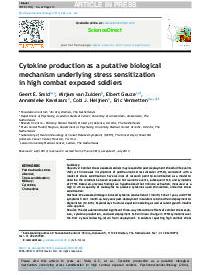Cytokine production as a putative biological mechanism underlying stress sensitization in high combat exposed soldiers
Objective: Combat stress exposed soldiers may respond to post-deployment stressful life events(SLE) with increases in symptoms of posttraumatic stress disorder (PTSD), consistent with amodel of stress sensitization. Several lines of research point to sensitization as a model todescribe the relations between exposure to traumatic events, subsequent SLE, and symptomsof PTSD. Based on previous findings we hypothesized that immune activation, measured as ahigh in vitro capacity of leukocytes to produce cytokines upon stimulation, underlies stresssensitization.Methods: We assessed mitogen-induced cytokine production at 1 month, SLE at 1 year, and PTSD symptoms from 1 month up to 2 years post-deployment in soldiers returned from deployment toAfghanistan (N = 693). Exploratory structural equation modeling as well as latent growth modelswere applied.Results: The data demonstrated significant three-way interaction effects of combat stress expo-sure, cytokine production, and post-deployment SLE on linear change in PTSD symptoms overthe first 2 years following return from deployment. In soldiers reporting high combat stress.
Geachte bezoeker,
De informatie die u nu opvraagt, kan door psychotraumanet niet aan u worden getoond. Dit kan verschillende redenen hebben,
waarvan (bescherming van het) auteursrecht de meeste voorkomende is. Wanneer het mogelijk is om u door te verwijzen naar de bron
van deze informatie, dan ziet u hier onder een link naar die plek.
Als er geen link staat, kunt u contact opnemen met de bibliotheek,
die u verder op weg kan helpen.
Met vriendelijke groet,
Het psychotraumanet-team.
Reference:
Geert E. Smid, Mirjam van Zuiden, Elbert Geuze, Annemieke Kavelaars, Cobi J. Heijnen, Eric Vermetten | 2014
In: Psychoneuroendocrinology, ISSN 0306-4530 | juli | 1-13
Epub ahead of print
In: Psychoneuroendocrinology, ISSN 0306-4530 | juli | 1-13
Epub ahead of print


